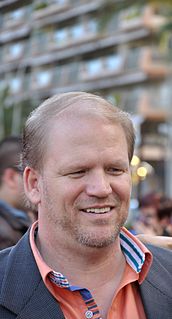A Quote by George Saunders
With non-fiction writing I feel like I'm confined and driven by what actually happened. That makes the "plot". So it's a process of getting all of my notes typed up, then scanning through the notes, trying to extract or find certain vignettes that seem like they might write well - that might have a potential for good energy, shape, etc. And then at some point I start stringing these together, keeping an eye on the word count.
Quote Topics
Related Quotes
All I really know in nonfiction is that when I come home, I've got all these notes and I'm trying to figure out what actually happened to me. I usually kind of know what happened, but as you work through the notes, you find that certain scenes write well and some don't even though they should. Those make a constellation of meaning that weirdly ends up telling you what you just went through. It's a slightly different process, but still there's mystery because when you're bearing down on the scenes, sometimes you find out they mean something different than what you thought.
For notes related to books I'm writing, I've wondered whether I should organize my notes better, but I do find that the action or scrolling through them and seeing odd juxtapositions of ideas helps to stimulate my own ideas and creativity. I worry that if I kept the notes in a highly-structured way, I might lose some of these benefits.
My best times are midnight to six actually. I'll leaf through my notebooks and if something catches my eye and I feel like I want to transfer it from the notebook to the page, I do, and then comes this very strange process which is difficult to describe in that I'll write until I get stuck or I can't go any further or I'm boring myself or whatever and then I might go to another poem.
You get notes from two studios and a network instead of a studio and a network. Although we early on forced them all to do their notes together. I make them all talk to each other first. Because we went through the pains of getting notes from ABC and at the time it was Touchstone, that were opposite - and then CBS notes that were opposite again. So it was, you guys are going to have to work it out as to what is the most important note.
I just chuck a bunch of words down and whether they find themselves into a song... I have lots of weird notes on my phone. I often come up with a phrase that I really like, I write it down and it stays in my notes folder, and when I'm writing I will scroll through and see if it kind of fits and if I can mould a verse around it.
Like how stars might sound. Or moons But not mountains. Too floaty for mountains. It's a sound like one planet singing to another, high stretched and full of different voices starting at different notes and sloping down to other different notes but all weaving together in a rope of sound that's sad but not sad and slow but not slow and all singing one word. One word.
I start my process hand written, and then I dump it in. It's like you're getting a second draft 'cause when I put it in the computer, I fix it and change stuff. That's my process. I picked that up from speaking to Neil Gaiman and Joe Hill. I was messing around with the idea of starting to write more, writing a book and doing things like this, and I reached out for advice. They were like, "Oh, we hand write, and then we dump it all in." I was like, "Great! There's no more blank pages."
I had a lot of great lakes of ignorance that I was up against, I would write what I knew in almost like islands that were rising up out of the oceans. Then I would take time off and read, sometimes for months, then I would write more of what I knew, and saw what I could see, as much as the story as I could see. And then at a certain point I had to write out what I thought was the plot because it was so hard to keep it all together in my head. And then I started to write in a more linear way.
I was like just writing and writing and then I kinda developed my sound. And then, my managers were like, "Okay, we're gonna try to get a deal." And then first it was Interscope, and then it was Atlantic. And then, I ended up signing with Atlantic, but it was like a long process, a really long... it was A LONG PROCESS. I feel like it took me two years to do it.





































